I
What shall I do with this absurdity —
O heart, O troubled heart — this caricature,
Decrepit age that has been tied to me
As to a dog's tail?
Never had I more
Excited, passionate, fantastical
Imagination, nor an ear and eye
That more expected the impossible —
No, not in boyhood when with rod and fly,
Or the humbler worm, I climbed Ben Bulben's back
And had the livelong summer day to spend.
It seems that I must bid the Muse go pack,
Choose Plato and Plotinus for a friend
Until imagination, ear and eye,
Can be content with argument and deal
In abstract things; or be derided by
A sort of battered kettle at the heel.
II
I pace upon the battlements and stare
On the foundations of a house, or where
Tree, like a sooty finger, starts from the earth;
And send imagination forth
Under the day's declining beam, and call
Images and memories
From ruin or from ancient trees,
For I would ask a question of them all.
Beyond that ridge lived Mrs. French, and once
When every silver candlestick or sconce
Lit up the dark mahogany and the wine,
A serving-man, that could divine
That most respected lady's every wish,
Ran and with the garden shears
Clipped an insolent farmer's ears
And brought them in a little covered dish.
Some few remembered still when I was young
Who'd lived somewhere upon that rocky place,
And praised the colour of her face,
And had the greater joy in praising her,
Remembering that, if walked she there,
Farmers jostled at the fair
So great a glory did the song confer.
And certain men, being maddened by those rhymes,
Or else by toasting her a score of times,
rose from the table and declared it right
To test their fancy by their sight;
But they mistook the brightness of the moon
For the prosaic light of day –
music had driven their wits astray –
And one was drowned in the great bog of Cloone.
Strange, but the man who made the song was blind;
Yet, now I have considered it, I find
That nothing strange; the tragedy began
With Homer that was a blind man,
And Helen has all living hearts betrayed.
O may the moon and sunlight seem
One inextricable beam,
For if I triumph I must make men mad.
And I myself created Hanrahan
And drove him drunk or sober through the dawn
From somewhere in the neighbouring cottages.
Caught by an old man's juggleries
He stumbled, tumbled, fumbled to and fro
And had but broken knees for hire
And horrible splendour of desire;
I thought it all out twenty years ago:
Good fellows shuffled cards in an old bawn;
And when that ancient ruffian's turn was on
He so bewitched the cards under his thumb
That all but the one card became
A pack of hounds and not a pack of cards,
And that he changed into a hare.
Hanrahan rose in frenzy there
And followed up those baying creatures towards —
O towards I have forgotten what — enough!
I must recall a man that neither love
Nor music nor an enemy's clipped ear
Could, he was so harried, cheer;
A figure that has grown so fabulous
There's not a neighbour left to say
When he finished his dog's day:
An ancient bankrupt master of this house.
Before that ruin came, for centuries,
Rough men-at-arms, cross-gartered to the knees
Or shod in iron, climbed the narrow stairs,
And certain men-at-arms there were
Whose images, in the Great memory stored,
Come with loud cry and panting breast
To break upon a sleeper's rest
While their great wooden dice beat on the board.
As I would question all, come all who can;
Come old, necessitous, half-mounted man;
And bring beauty's blind rambling celebrant;
The red man the juggler sent
Through God-forsaken meadows; Mrs. French,
Gifted with so fine an ear;
The man drowned in a bog's mire,
When mocking muses chose the country wench.
Did all old men and women, rich and poor,
Who trod upon these rocks or passed this door,
Whether in public or in secret rage
As I do now against old age?
But I have found an answer in those eyes
That are impatient to be gone;
Go therefore; but leave Hanrahan,
For I need all his mighty memories.
Old lecher with a love on every wind,
Bring up out of that deep considering mind
All that you have discovered in the grave,
For it is certain that you have
Reckoned up every unforeknown, unseeing
Plunge, lured by a softening eye,
Or by a touch or a sigh,
Into the labyrinth of another's being;
Does the imagination dwell the most
Upon a woman won or woman lost?
If on the lost, admit you turned aside
From a great labyrinth out of pride,
Cowardice, some silly over-subtle thought
Or anything called conscience once;
And that if memory recur, the sun's
Under eclipse and the day blotted out.
III
It is time that I wrote my will;
I choose upstanding men
That climb the streams until
The fountain leap, and at dawn
Drop their cast at the side
Of dripping stone; I declare
They shall inherit my pride,
The pride of people that were
Bound neither to Cause nor to State,
Neither to slaves that were spat on,
Nor to the tyrants that spat,
The people of Burke and of Grattan
That gave, though free to refuse –
Pride, like that of the morn,
When the headlong light is loose,
Or that of the fabulous horn,
Or that of the sudden shower
When all streams are dry,
Or that of the hour
When the swan must fix his eye
Upon a fading gleam,
Float out upon a long
Last reach of glittering stream
And there sing his last song.
And I declare my faith:
I mock Plotinus' thought
And cry in Plato's teeth,
Till man made up the whole,
Made lock, stock and barrel
Out of his bitter soul,
And further add to that
That, being dead, we rise,
dream and so create
Translunar Paradise.
I have prepared my peace
With learned Italian things
And the proud stones of Greece,
Poet's imaginings
And memories of love,
Memories of the words of women,
All those things whereof
Man makes a superhuman
Mirror-resembling dream.
As at the loophole there
The daws chatter and scream,
And drop twigs layer upon layer.
When they have mounted up,
The mother bird will rest
On their hollow top,
And so warm her wild nest.
I leave both faith and pride
To young upstanding men
Climbing the mountain side,
That under bursting dawn
They may drop a fly;
Being of that metal made
Till it was broken by
This sedentary trade.
Now shall I make my soul,
Compelling it to study
In a learned school
Till the wreck of body,
Slow decay of blood,
Testy delirium
Or dull decrepitude,
Or what worse evil come –
The death of friends, or death
Of every brilliant eye
That made a catch in the breath –
Seem but the clouds of the sky
When the horizon fades;
Or a bird's sleepy cry
Among the deepening shades.










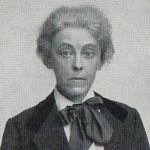
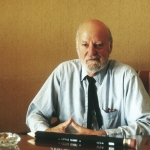
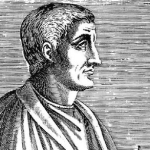

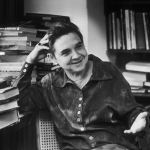
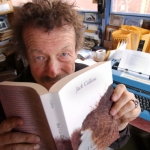


Comment form: